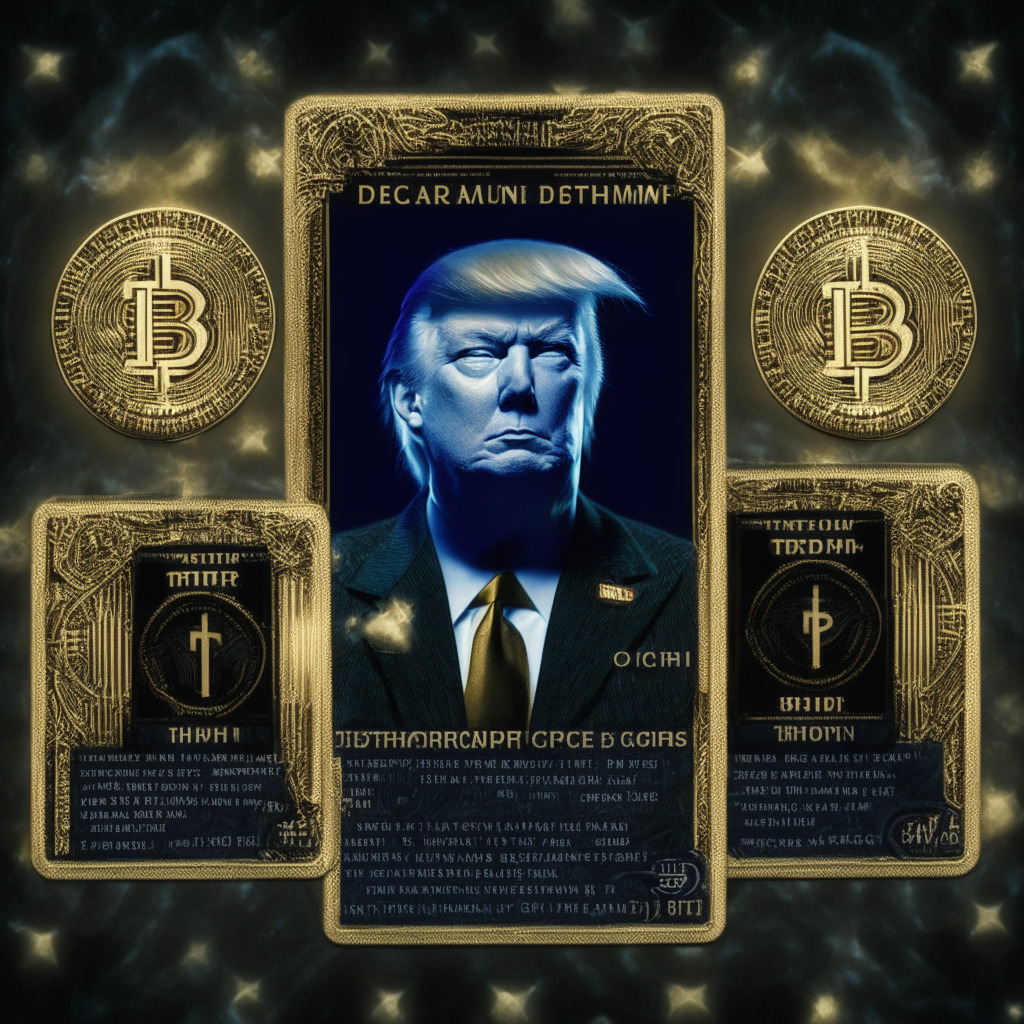“Crypto guru, Brian Armstrong, predicts that the exploding interest in crypto will turn it into a defining issue in the 2024 elections. As 56 million Americans already operate with digital currency, its potential implications are engaging presidential candidates. However, the quest for clear crypto regulation still looms, with opportunities for legislative clarity potentially arising from the Securities and Exchange Commission.”
Search Results for: Robert F. Kennedy Jr.
Exploring the Political Spectrum: The Rising Influence of Bitcoin Mining and Cryptocurrencies
Senator Ted Cruz endorses Bitcoin, highlighting its potential in bolstering energy grid resilience—an advantage in emergencies, such as the recent Texas extreme weather. The stance reflects the growing influence of digital currencies, despite potential hurdles and economic turbulence.
The New ‘Crypto-politics’: Pros and Cons of Accepting Cryptocurrency Donations in Political Campaigns
“Florida’s Governor, Ron DeSantis, plans to announce the acceptance of crypto donations for his 2024 campaign, an interesting turn from traditional funding. However, cryptocurrency donations introduce complexity regarding traceability and potential misuse. The political landscape’s inherent unpredictability combined with cryptocurrency’s volatility invite intriguing consequences.”
Secret Cryptography: Trump’s Hidden Digital Assets Stir Presidential Crypto Debates
Former US President Donald Trump reportedly holds $2.8 million in a digital wallet, a larger sum than previously disclosed. Trump’s venture into the crypto domain began with his NFT endeavor, Trump Digital Collectible Cards. The discovery shows his deepened involvement in cryptocurrency. Meanwhile, other presidential candidates voice their crypto policies, underlining the rising influence of cryptocurrencies on the political stage.
Central Bank Digital Currency: A Financial Freedom Foe or Decentralized Ally?
Joe Rogan and Post Malone voiced skepticism about US central bank digital currency (CBDC), seeing it as potentially enabling government control over individual finances. This controversy, along with alternatives such as decentralized cryptocurrencies, forms a pivotal part of ongoing discussions about the future of digital currencies.
Presidential Hopeful’s Take on Bitcoin: Asset, but Not Dollar Stabilizer
Republican Presidential candidate Vivek Ramaswamy, while expressing fondness for Bitcoin, would not consider it as a component to stabilize the U.S. dollar. He believes the U.S. Federal Reserve should focus on maintaining dollar stability against traditional commodities.
Crypto Market Flux: Regulatory Tremors, Political Shocks, and IRS Intrusions
The crypto market recently experienced a plunge, with Bitcoin dipping around 2%, amidst political and lawsuit shocks. The SEC has accused Richard Heart, Hex creator, of selling unregistered securities worth $1 billion, causing the HEX price to plummet. This has led to increased anxiety in the crypto community, with investors also watching out for potential regulations. Meanwhile, the IRS has issued a ruling requiring US taxpayers to add crypto staking rewards to their annual income. Despite the challenges, crypto enthusiasts see potential in the top 15 digital assets for 2023, but caution and thorough research are advised.
Campaign Promises and Crypto: How Political Stances May Shape the Future of Bitcoin
Florida Governor Ron DeSantis, during his 2024 presidential campaign, vowed to prohibit central bank digital currencies (CBDCs) and suppress any policy by the current Biden’s administration pertaining to Bitcoin and cryptocurrency regulation. The move has sparked renewed conversations about digital currencies in the political sphere.
Regulatory Uncertainty, DeFi Accountability, and Cryptocurrency-backed Dollar: A Crypto Crossroads
Regulation discussions remain a pressing issue in the cryptocurrency space. With the SEC undecided on Ripple’s ruling, a newly-introduced U.S Senate bill targeting decentralized finance (DeFi), and proposals of Bitcoin being utilized to strengthen the U.S dollar, the future of cryptocurrency is fascinatingly unpredictable.
Potential Presidential Candidate DeSantis’s Vehement Opposition to CBDCs: A Threat to Blockchain Future or a Guard Against Government Control?
Potential U.S presidential candidate, Ron DeSantis, opposes Central Bank Digital Currencies (CBDCs), believing they could grant undue control to the government and violate privacy rights. However, supporters believe CBDCs could promote global adoption of blockchain technology. This dynamic discourse could redefine the future of digital currency in the U.S.
Bitcoin ETFs – A False Dawn or a Beacon of Hope? Be Ready for the Crypto Rollercoaster
The recent dip in Bitcoin price followed a wave of ETF applications in the US which failed to shift market sentiment as anticipated. JPMorgan’s analysis suggests lack of transformative potential in the US ETF landscape. Despite this, ‘whales’ have accumulated an additional equivalent of $2.15 billion in Bitcoin, opposing the JPMorgan analysis. Understanding volatility and risk in digital assets is crucial before making financial decisions.
Balancing Privacy and Efficiency in Retail CBDCs: Pros, Cons, and Conflicts
U.S. Treasury official Graham Steele highlighted the importance of privacy and anonymity in developing a potential retail Central Bank Digital Currency (CBDC) and suggested that Privacy Enhancing Technologies be considered for preserving user anonymity. Steele also discussed pros, cons, and challenges, including minimizing illegal transactions and ensuring privacy.
Will Democrats Lose Young Crypto Voters? Analyzing the Winklevoss Claims and the Political Divide
The Winklevoss twins suggest that the Democratic Party’s perceived “war on crypto” could cost them key young voters in upcoming elections. Young people, who largely supported Democrats previously, make up a significant portion of cryptocurrency adopters. It remains uncertain how important crypto policy is to young voters compared to other issues.
Debt Ceiling Agreement Blocks Crypto Mining Tax: A Win for the Industry or Environmental Setback?
The recent U.S. debt ceiling agreement has notably blocked the proposed Digital Asset Mining Energy (DAME) excise tax, preventing a 30% tax imposition on cryptocurrency mining firms. This outcome, seen as a victory for the crypto industry, has sparked debates around the environmental impact of crypto mining operations and the importance of addressing energy consumption concerns for a sustainable future.
Biden’s 30% Bitcoin Mining Tax: Balancing Environmental Concerns and Industry Growth
Senator Cynthia Lummis strongly opposes the Biden Administration’s proposal for a 30% tax on electricity for Bitcoin miners. Critics argue this could drive the industry offshore, while supporters claim it addresses environmental concerns. The debate highlights complexities in regulating the digital asset industry and balancing consumer protection, sustainability, and innovation.
Bitcoin: Future Monetary Dominance or Trapped in Traditional Finance’s Shadow?
Bitcoin’s growing number of “wholecoiners,” or addresses holding at least 1 BTC, indicates potential shift towards hyperbitcoinization, where Bitcoin replaces traditional financial institutions as the dominant value system. However, debates persist on the superiority of centralized fiat systems for everyday transactions and challenges including cybersecurity remain in the crypto market.
Crypto Market Stagnation: Fed Rate Hikes, DAME Tax Resistance, and Political Debates
The crypto market’s recent stagnation is due to factors like Federal Reserve’s interest rate hikes, regulatory developments such as the proposed Digital Asset Mining Energy tax, and politicians voicing concerns about cryptocurrencies. Despite this, cryptocurrencies gain widespread attention and face increasing regulation as debates on growth, energy consumption, and political implications continue.
Crucial Crypto Updates: The Bitcoin Slump, Crypto Aid Israel and The Rise of BitVM
Bitcoin’s value hovers at $27,653 as Robert F. Kennedy Jr, a crypto enthusiast, vies for presidency as an independent, proposing the reinforcement of the US dollar with Bitcoin among other assets. Cryptocurrency organizations, including Fireblocks, offer aid in the midst of the Israel crisis, suggesting possible integration of crypto in traditional finance systems. Robin Linus unveils BitVM, potentially importing Ethereum-level smart contracts to the Bitcoin sphere.
















